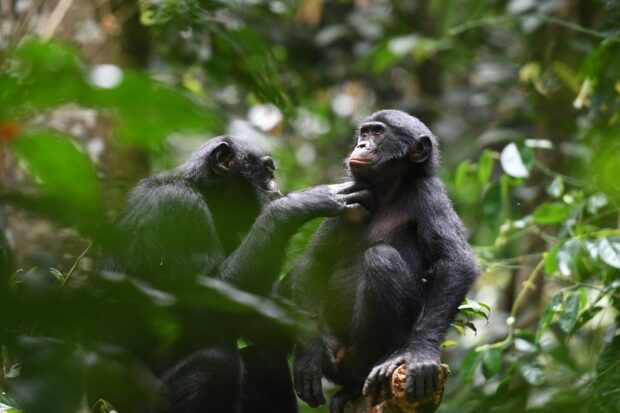Bad boys: Study finds aggressive bonobo males attract more mates

This undated handout picture provided by the Kokolopori Bonobo Research Project shows bonobos grooming each other at the Kokolopori Bonobo Reserve in the Democratic Republic of Congo. Human society is founded on our ability to cooperate with others beyond our immediate family and social groups. According to a study published on November 16, 2023 in Science, we’re not alone: bonobos team up with outsiders too, in everything from grooming to food sharing and even forming alliances against sexual aggressors. Lead author Liran Samuni of the German Primate Center in Goettingen told AFP studying the primates offered a “window into our past,” possibly signaling an evolutionary basis for how our own species began wider scale collaborative endeavours. Bonobos (Pan paniscus) are our closest living relatives, alongside chimpanzees (Pan troglodytes), and the two species are also very closely related to each other. (Photo by Martin SURBECK / Kokolopori Bonobo Research Project / AFP)
Washington, United States — Humankind’s two closest primate relatives are often said to embody contrasting sides of our nature: peace-loving bonobos versus violence-prone chimpanzees.
But a new study out Friday in Current Biology says it’s not that simple. Male bonobos in fact fight each other more often than male chimps do — and the bonobo “bad boys” who have more dust-ups also see greater mating success.
READ: Bonobos prefer bullies over ‘nice guys’
Lead author Maud Mouginot of Boston University told AFP she decided to investigate the question of aggression among bonobos after prior research revealed a “reproductive skew” among males, meaning some fathered far more offspring than others.
“So the question was, if bonobos are not that aggressive, how can they have such a high reproductive skew?” she said.
Article continues after this advertisementSince their recognition as a species distinct from chimpanzees, bonobos have been romanticized for their free-spirited nature.
Article continues after this advertisementPart of their reputation as “hippies” stems from how they use sex as a means of conflict resolution and often have same sex couplings, especially among females. They’re also more likely to share food than chimps.
Researchers had previously attempted to compare aggression between the two species, which share 99.6 percent of their DNA with each other, but these studies were limited because they used differing methods in the field.
READ: Apes also remember friends they haven’t seen for ages
Mouginot and her colleagues focused on three communities at the Kokolopori Bonobo Reserve in the Democratic Republic of Congo, and two chimpanzee communities at Gombe National Park in Tanzania.
By tracking the individual behavior of 12 male bonobos and 14 male chimpanzees over two years, the team was able to compile data on how often each engaged in aggressive interactions, who these encounters involved, and whether there was physical contact such as biting and pushing or simply charging at a rival.
Surprisingly, the researchers discovered that male bonobos exhibited higher levels of aggression than chimpanzees. Specifically, bonobos engaged in 2.8 times as many aggressive encounters and three times as many physical altercations as did their chimpanzee counterparts.
“That’s, I think, the big finding of the paper,” said Mouginot. “And the other thing is, we actually found that more aggressive male bonobos win more copulation with what we call ‘maximally tumescent females,'” meaning females whose genitals have swollen because they are ovulating.
More time with females?
Male bonobos almost exclusively reserved their aggression for other males, while male chimpanzees were more likely to become aggressive with females.
Both these findings aligned with expectations. Bonobo females are often leaders in their groups and form alliances to stop lone males who may attempt to coerce them sexually, so it makes little sense for males to challenge them.
Conversely, chimpanzees are strongly male-dominant societies, and it’s the males that band together, coercing females into sex or punishing male adversaries that challenge their authority.
The fact that male bonobo disputes are overwhelmingly one-on-one, rather than one-against-many, might explain why they happen more often, said Mouginot, as the stakes are lower. Bonobos have never been reported to kill each other.
Chimpanzee altercations, on the other hand, involve multiple males and can result in fatalities — either within their own group, or in territorial battles against rival groups. The greater costs associated with chimp combat might therefore limit how often it occurs.
As for why “nicer” bonobo males fared worse with females — “it’s possible that those aggressive males can also spend more time with females” by vanquishing rivals, said Mouginot, but this would require further confirmation.
But Mouginot, who now focuses her anthropological work on humans, is skeptical about whether “bad boy” tropes in people — the idea that men who are troublemakers tend to attract more women — map directly onto bonobos.
Female bonobos, she emphasized, wield significant power and won’t hesitate to shut down male aggression when directed at them. But it’s possible they might find it attractive when it is directed at others.